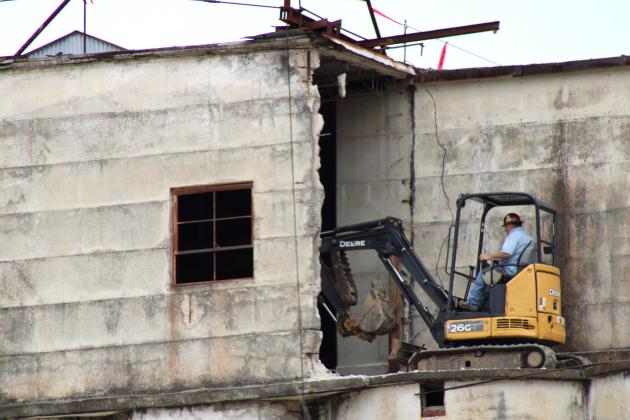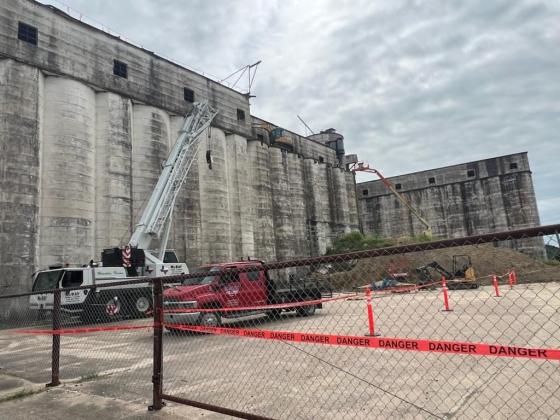A changing landscape:
Dayton's rice industry just a memory
DAYTON — As the area continues to grow, it brings change, but for a once thriving rice farming community, its rich history has become a thing of the past.
Last week, a pair of local projects helped make that reality even more apparent as crews began demolition of the old American Rice Growers dryer in downtown Dayton, and land developers announced they had obtained an area off Highway 99 and FM 686 from a family synonymous with the rice industry.
The dryer served as a hub for rice farmers. In fact, Dayton's moniker, the crossroads, is due in great part to that very facility. The site was used to dry and store rice from all around.
For Liberty County Judge Jay Knight, the ordeal is bittersweet, as his father, Joe Audway Knight, ran the dryer from 1949 until 1982 and returned on two other occasions in the mid-80s and early 90s.
"It's emotional in several ways for me. When Dad finished college, he returned to Dayton and went to work at Dayton State Bank, and one day Mr. Jamison, that's W.T. Jamison, said they had a place they needed him to work," Knight said.
Jamison believed that Joe Knight's skill set was better served by the American Rice Growers, who needed a manager, and in 1949, he took on that role.
Knight spoke about how that impacted his life, as he was raised around the business and had an opportunity to see up close and work in nearly every aspect of the business.
"I got to see it all, right there with my Dad," Knight said.
Knight spoke proudly of his father and his work and gave high praise to the farmers who made things happen in Dayton.
Knight shared some of the unfortunate events that led to the downfall of the farming industry in the area, including government involvement that reduced the amount farmers could produce, Hurricane Carla, and eventually, a grain embargo imposed on Russia in the late 70s.
"In Liberty County, that was a death sentence for rice," Knight said.
Knight recounted a story of a news reporter who showed up and wanted to speak with his father about Jimmy Carter's grain embargo, a topic he was not thrilled to talk about.
An emotional Knight recanted his dad's words, "The way of life as you know it in Liberty County just changed forever," which Knight said was all he had to say about it.
In September 2008, the rice dryer suffered some damage. In 2010, the property was purchased by Randy Ripkowski, who planned to demolish the structure at the time, but due to circumstances, removal had been placed on the back burner until now.
Last week, Ripkowski obtained the permits needed, and crews went to work last Wednesday morning to remove the massive structure.
According to Dayton City Manager Kimberly Judge, it was a sad day for her as the dryer always symbolized you were home upon returning from a trip, but the privately owned property was out of her control.
Judge said everything was in order for the demolition to take place, but there was no word on what would happen with the property.
The other major announcement that seemed to help close the door on the farming industry in the Dayton area came with the announcement of a new development called Freedom Trail, which will be located off the Grand Parkway.
That development will be constructed on property once owned by the Stoesser family, and according to the Houston Business Journal, there is an additional 2,000-3,000 acres that the family is in negotiations to sell to Windy Hill Development.
The current phase of the new subdivision will be the first directly located on the Grand Parkway in Liberty County. It is a 420-acre single-family home development that includes commercial use.
Knight was glad that many of the rice farming families in the area were able to hold onto the property over the years and would be able to benefit from all of the new developments moving to the area.
Another development tied to the rice farming community is the River Ranch development on Highway 146, where American Rice Growers once owned some of the property.
In the end, Knight summarized his father's thoughts on the end of the farming industry, which was just a fleeting memory now.
"It broke his heart to see everything that these farmers had worked for coming out of World War II and turn it into a giant industry, not just in our county, but Southeast Texas, and it just went down," Knight concluded.


